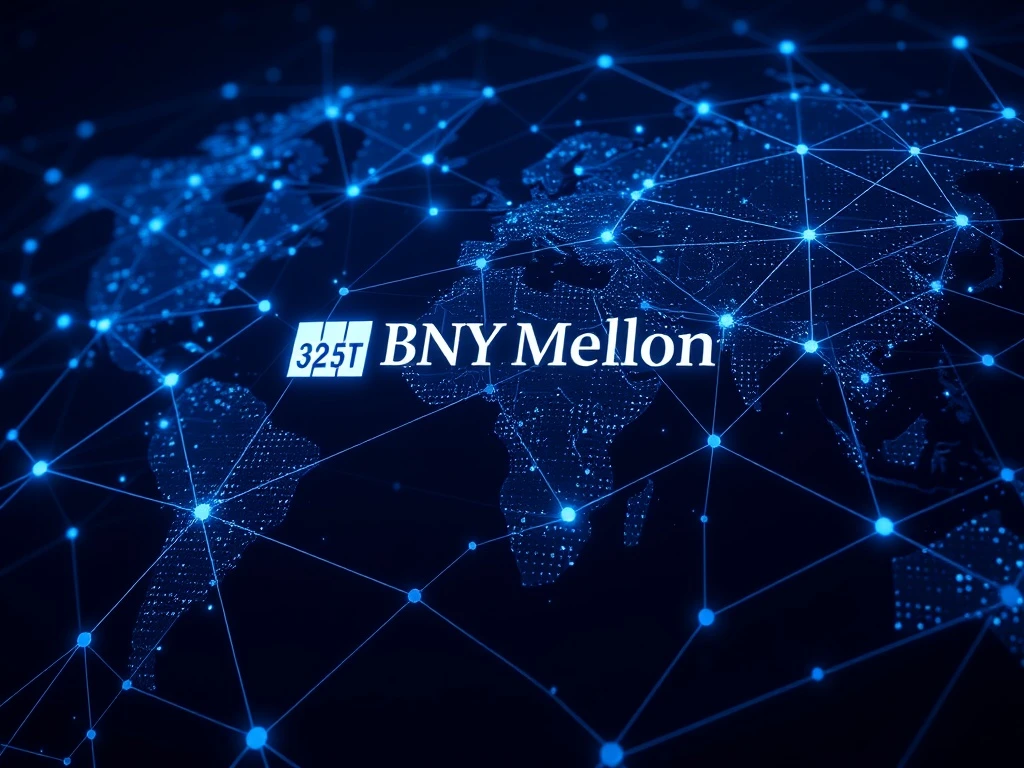Tokenized Deposits Unleash a Revolutionary Era for BNY Mellon’s $2.5 Trillion Payment Network

BNY Mellon, a titan in the global financial sector, manages an astounding $2.5 trillion in daily payment flows. This colossal network now stands at the precipice of a significant transformation. The bank is actively exploring **tokenized deposits** to modernize its operations. This strategic move signals a profound shift towards integrating blockchain technology into mainstream finance. It promises enhanced efficiency and unparalleled speed for transactions worldwide.
Understanding Tokenized Deposits: A New Paradigm for Finance
Financial institutions are constantly seeking innovative solutions. Therefore, the concept of **tokenized deposits** has gained substantial traction. These digital coins are directly backed one-to-one by commercial bank money. They represent a direct claim on bank balances. This characteristic distinguishes them from stablecoins, which often rely on securities or third-party reserves for backing. Essentially, tokenized deposits offer a robust, regulated digital representation of traditional bank funds.
Carl Slabicki, executive platform owner for Treasury Services at BNY Mellon, highlighted the potential. He noted that tokenized deposits can help banks overcome legacy technology constraints. This innovation makes it easier to move deposits and payments across their own ecosystems. Furthermore, as industry standards mature, this capability will extend across the broader market. This technological advancement promises a future with more agile and responsive financial systems.
BNY Mellon’s Strategic Vision for Blockchain Payments
As the largest custodian bank globally, BNY Mellon possesses immense influence. Its exploration of **blockchain payments** for its vast network is therefore highly significant. The bank aims to move a portion of its $2.5 trillion daily payment flow onto blockchain rails. This initiative seeks to enable clients to transfer funds instantly, 24/7. It also intends to ease the constraints imposed by its existing legacy systems.
Slabicki confirmed that this project forms part of a larger effort. This effort focuses on upgrading both real-time and **cross-border settlements**. The adoption of blockchain technology promises to streamline complex processes. It also offers increased transparency and reduced operational costs. This strategic vision positions BNY Mellon at the forefront of financial innovation.
Revolutionizing Cross-Border Settlements with Blockchain
Traditional **cross-border settlements** often involve multiple intermediaries. This complexity leads to delays, high fees, and limited operating hours. However, tokenized deposits present a powerful solution to these long-standing challenges. By leveraging blockchain technology, transactions can occur directly between parties. This directness bypasses many conventional bottlenecks.
BNY Mellon is not alone in recognizing this potential. The bank is actively collaborating with SWIFT, the global financial messaging network. Together with over 30 other institutions, they are building a shared blockchain-based ledger. This ledger aims to facilitate real-time international payments. Such a collaborative approach underscores the industry’s commitment to modernizing global finance. It heralds a new era of efficiency and accessibility for international transactions.
The Promise of Real-Time Payments and Broader Integration
The demand for **real-time payments** continues to grow across all sectors. Consumers and businesses alike expect immediate fund transfers. Tokenized deposits offer a robust mechanism to meet this expectation. They provide instant settlement capabilities, ensuring funds are available almost instantaneously. This 24/7 accessibility transforms the traditional banking landscape.
Moreover, BNY Mellon is extending its blockchain initiatives beyond core payments. In July, Goldman Sachs and BNY Mellon announced a partnership. They will offer institutional clients access to tokenized money market funds. This collaboration aims to bring real-time settlement and round-the-clock market access to traditional finance. The ownership of these funds will be recorded on Goldman’s private blockchain. This initiative includes major players like BlackRock, Fidelity, and Federated Hermes, further solidifying its importance.

Broader Industry Adoption: A Wave of Blockchain Payments Initiatives
BNY Mellon’s announcement arrives amidst a surge of similar initiatives across the financial industry. This collective movement highlights a growing consensus regarding blockchain’s transformative power. Several major banks are actively piloting or launching their own **blockchain payments** solutions. This widespread adoption indicates a significant paradigm shift in how financial institutions view digital assets and distributed ledger technology.
Key initiatives include:
- JPMorgan’s JPMD: JPMorgan launched its own tokenized deposit pilot, JPMD, in June. This initiative aims to streamline interbank transfers.
- HSBC’s Cross-Border Service: HSBC followed suit last month, rolling out a cross-border tokenized deposit service for corporate clients. This service focuses on enhancing international trade finance.
- SBI Shinsei Bank Partnership: In September, SBI Shinsei Bank partnered with Singapore’s Partior and Japan’s DeCurret DCP. They are exploring multicurrency tokenized deposits for cross-border settlements. This trio signed an MOU to develop a blockchain-based framework. This framework enables real-time clearing across various currencies.
The broader trend of Real World Asset (RWA) tokenization further supports these developments. RWA tokens recently surged 11% weekly, with on-chain value peaking at $29 billion. This growth demonstrates increasing confidence in tokenizing tangible and intangible assets, further validating the utility of blockchain in traditional finance.
The Future Landscape of Finance: Powered by Tokenized Deposits
The exploration of **tokenized deposits** by BNY Mellon and other financial giants marks a pivotal moment. It signifies a definitive move towards a more efficient, transparent, and globally interconnected financial system. Blockchain technology offers solutions to long-standing challenges in payments and settlements. Consequently, its integration into core banking operations will redefine how money moves around the world.
The continuous innovation in this space promises significant benefits. These include reduced transaction costs, enhanced security, and 24/7 operational capabilities. As standards mature and regulatory frameworks evolve, tokenized deposits will likely become a cornerstone of modern finance. This revolutionary approach ensures that the financial industry remains adaptable and competitive in an increasingly digital world.







